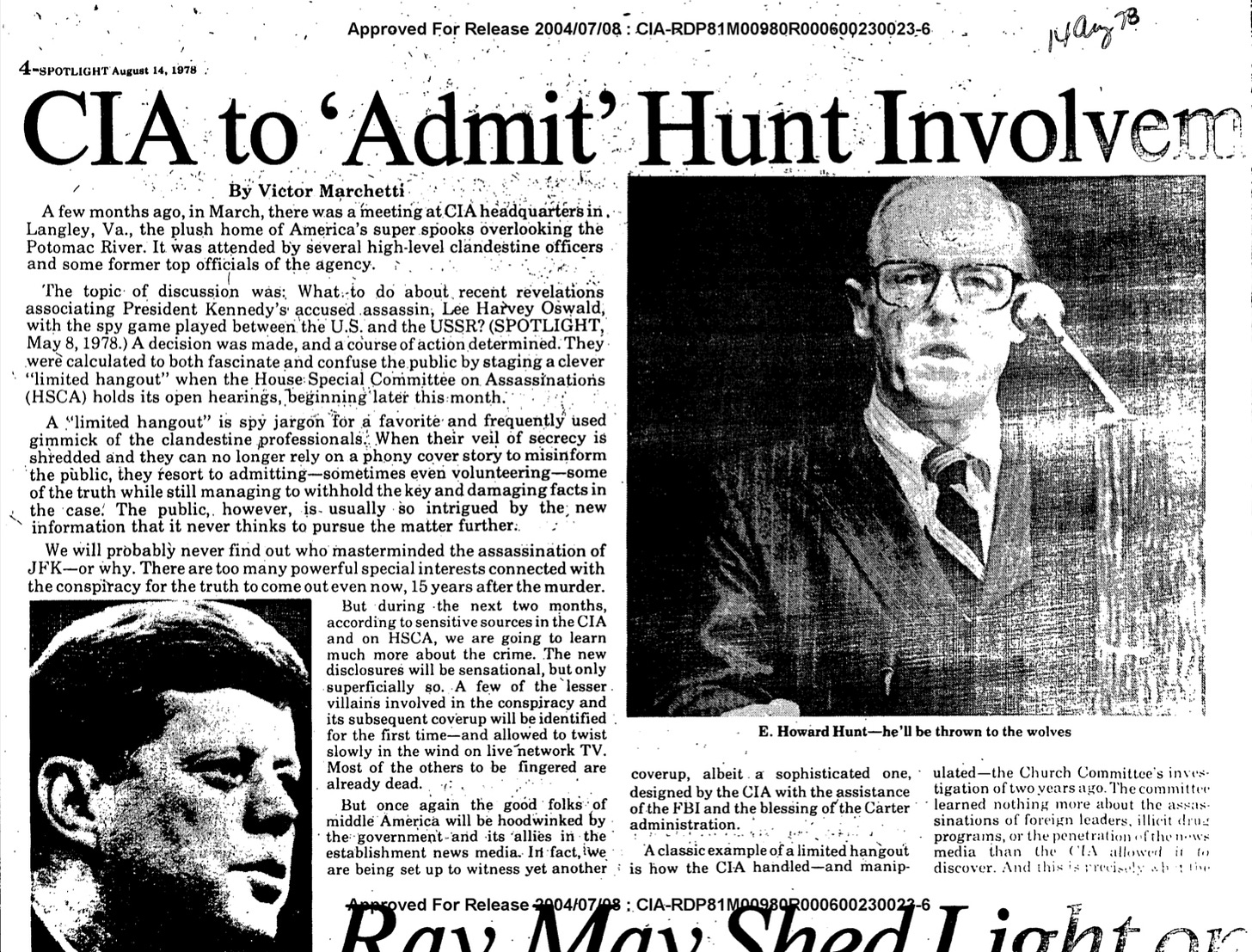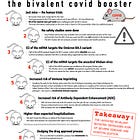One of the themes of Now has been presented as a struggle between strategy and integrity, as if these two things exist in opposition, on either end of a metaphorical see-saw.
A recent policy statement published in the New England Journal of Medicine brings this seeming dipole under the proverbial microscope.
The reader is encouraged to read this brief article for themselves.
The problematic assumptions embodied in this published statement are rife, but the most obvious and egregious omissions, are these:
The COVID shots were never needed.
Efficacy remains unproven.
Safety of the shots was never truly assessed.
The shots and boosters demonstrably increase risk and disease.
The harm and death associated with the shots is nothing short of monstrous.
The authors, Prasad and Makary, hold onto a few precious pearls:
The shots are needed to protect the ‘vulnerable’ (primarily the elderly over 65).
Access to the injectable products must be maintained.
The takeaway: make some tweaks, but don’t stop the injection program.
Embedded within the short NEJM piece are a number of fallacies and statements worth critiquing. A great many assumptions are passed off, as if undisputed, via the authors’ tone and wording.
The very first paragraph is demonstrative:
Over the past 5 years, the United States has moved toward an annual Covid-19 booster program. Each fall, Covid-19 booster shots are developed, alongside seasonal influenza vaccines, and are recommended for every American. As compared with vaccination policies in all European nations, the U.S. policy has been the most aggressive (see Fig. 1). While all other high-income nations confine vaccine recommendations to older adults (typically those older than 65 years of age), or those at high risk for severe Covid-19, the United States has adopted a one-size-fits-all regulatory framework and has granted broad marketing authorization to all Americans over the age of 6 months. The U.S. policy has sometimes been justified by arguing that the American people are not sophisticated enough to understand age- and risk-based recommendations. We reject this view.
Their unwritten assumption is that boosters are here to stay: they admit that the US is a bit over-zealous, but it’s still a program worth continuing. For Prasad and Makary, there is no need to overturn this stone—questioning if the boosters are actually helpful, harmful, or needed at all—never mind that they were initially green-lit using data from a few handfuls of mice.1 They seem to want to come across as being sensitive to Americans that have been insulted by past government administrators, but they aren’t about to question underlying assumptions.
Prasad and Makary continue:
Although the rapid development of multiple Covid-19 vaccines in 2020 represents a major scientific, medical, and regulatory accomplishment, the benefit of repeat dosing — particularly among low-risk persons who may have previously received multiple doses of Covid-19 vaccines, had multiple Covid-19 infections, or both — is uncertain. The American people, along with many health care providers, remain unconvinced.
What exactly was the ‘major accomplishment’ here? The proponent’s ‘science’ was woefully inadequate, if not fraudulent and misrepresented. The medical accomplishment seems to have been a collective brainwashing of medical professionals and widespread iatrogenic harm. And the regulatory accomplishment? Should we now be proud that the Emergency Use Authorization process was used to rapidly deploy an untested, largely unscrutinized and undocumented injectable countermeasure, sidestepping established rules and regulations for biologics?2
Further, the question of purported benefit of *any dosing*, for any person, of any so-labeled risk-group, is a topic they presume they know the answer to, but this has really not been adequately scientifically demonstrated either. Here again, they tickle a few details, but leave the underlying assumptions unquestioned.
The duo continues:
Over the past two seasons, uptake of the annual Covid-19 booster has been poor, according to the Centers for Disease Control and Prevention (CDC). Less than 25% of Americans received boosters each year, ranging from less than 10% of children younger than 12 years of age in the 2024–2025 season to 50% of adults over 75 years old. Even health care workers remain hesitant, with less than one third participating in the 2023–2024 fall booster program. There may even be a ripple effect: public trust in vaccination in general has declined, resulting in a reluctance to vaccinate…
This is language employed to reinforce the narrative that reluctance to take more Covid shots is responsible for ‘vaccine hesitancy’ and is negatively affecting uptake of other shots on the childhood schedule. The unspoken premise here, of course, is that vaccination as an institution is faultless, and ‘safe and effective’.
It couldn’t possibly be that for many, any semblance of trust has been destroyed. People have witnessed institutional fraud on a massive scale under COVID which has prompted them to learn about other, older examples of lies and fraud, promulgated under the auspices of the very same agencies. Perhaps Prasad and Makary themselves are uninitiated to the knowledge already digested by the ‘vaccine hesitant’. Instead of parroting a narrative, perhaps they should engage their scientific curiosity to find out for themselves what might really lie at the root of this ‘reluctance to vaccinate’.
The duo also tacitly accept the almost mythical over-valuation of ‘immunologic endpoints’ (translation: antibody titers used as a surrogate measurement to infer effectiveness); aka, ‘immunobridging’, long falsely equated with proof of vaccine efficacy.
Moving forward, the FDA will adopt the following Covid-19 vaccination regulatory framework: On the basis of immunogenicity — proof that a vaccine can generate antibody titers in people — the FDA anticipates that it will be able to make favorable benefit–risk findings for adults over the age of 65 years and for all persons above the age of 6 months with one or more risk factors that put them at high risk for severe Covid-19 outcomes, as described by the CDC (Figure 2).
-
Nicolas Hulscher posted a critique, and his assessment is pointed and direct.
The FDA’s new policy is a quiet acknowledgment that the prior “one-size-fits-all” vaccine strategy was unscientific and unjustified. But admission without accountability is not enough. COVID-19 mRNA injections are neither safe nor effective. They have caused massive harm and incalculable loss of life. Continuing to authorize these products for any group is a profound violation of public trust — and contrary to the FDA’s belief, their new plan won’t restore confidence, but will only expand the black hole of public distrust.
The COVID-19 shots must be removed from the market.
Not rebranded.
Not reauthorized.
Removed.
Strategy, Integrity, and Truth
Prasad and Makary are said to be engaging in a ‘pivot’ (as recently described by James Lyons-Weiler) but they are—more significantly, I would argue—leaving the base assumptions of the COVID narrative unquestioned. If there is a pivot, then it reads not unlike slightly turning the gun turret on a tank for shot trajectory, all the while the tank itself continues to barrel forward, crushing opposition under its treads.
Some have called the Prasad/Makary approach ‘strategic’.
Others are inclined to be less charitable.
We began by positing the notion of a see-saw pitching ‘strategy’ against ‘integrity’. This may, in fact, be a false dichotomy, but still worth considering, nevertheless, as a mental exercise. Words have power and bring focus to thoughts, so it might behoove us to pause to consider what the subject words ‘strategy’ and ‘integrity’ mean and where they come from.
Strategy
The origins of strategy has a decidedly military orientation, being linked to the Greek strategos ‘commander of an army’, which itself is rooted in notions of leadership, combining stratos ‘camping army’ with agos ‘leader’. By the 1800’s it came to connote ‘the art of a general’ or ‘the art of war’.
Strategy is, literally, the way of the commander of an army.
Integrity
Integrity comes to us from the same roots as integer, combining the proto-indo-european root in ‘not’ with tangere ‘touch’.
in + tangere = ‘not touched’ or ‘untouched’
This might be interpreted as ‘pure’ or ‘whole’. As context, one might consider the notion of a whole-number integer as opposed to a numerical fraction (fraction literally meaning, ‘a breaking’).
Integrity literally means ‘unbroken’.
Truth
Despite the common interpretation of truth as fact, the older sense of truth is worth pondering. Ideas such as ‘faith’, ‘fidelity’, ‘loyalty’, and kinship lie at the core, as does the kernel of a ‘promise’ or ‘pledge’. Consider the word betrothed in this context.
The sense of truth as fact or real appears to only appear after the middle of the 17th century and the growth of empiricism and natural philosophy at the root of modern science.
The modern scientific sense of the word fact, has important roots:
The modern, empirical, sense of "thing known to be true, a real state of things, what has really occurred or is actually the case," as distinguished from statement or belief, is from 1630s, from the notion of "something that has actually occurred." The particular concept of the scientific, empirical fact ("a truth known by observation or authentic testimony") emerged in English 1660s, via Hooke, Boyle, etc., in The Royal Society, as part of the creation of the modern vocabulary of knowledge (along with theory, hypothesis, etc.); in early 18c. it was associated with the philosophical writings of Hume. Middle English thus lacked the noun and the idea of it; the closest expression being perhaps thing proved (c.1500).3
Truth, we see is not necessarily the same as fact, and what’s more, subject to belief, promises, and loyalties.
By their meanings alone, we can see that strategy and integrity are not opposites or mutually exclusive. Both can exist simultaneously. The decision to give primacy to one over the other is a choice, and not an insignificant one.
Can strategy be a corrupting influence?
Notice that strategy often comes to the public in a top-down fashion, as befits the root meaning of the word. People are often admonished to withhold judgement because the game afoot is one of ‘multi-dimensional chess’ or operating with a degree of nuance which escapes the ‘less strategically-minded’ observer.
That may—perhaps—be true, to a certain extent.
But while strategy can seem detached and driven by the complexities of politics and bureaucracies, integrity tends to bring a more instinctive understanding, and resonates broadly.
Perhaps this is because, unlike truth, which can connote beliefs and loyalties, integrity embodies something unsullied, uncorrupted, uncompromised.
Truth can be in the eye of the beholder, whereas, like the needle of a compass, integrity is supposed to point consistently and unflinchingly.
Strategy often bends truth, in the sense that certain compromises are made toward accomplishing particular goals or navigating difficult obstacles and challenges. In the realms of politics and government, this might be somewhat inevitable. An important consideration, however, is not solely what strategy might possibly accomplish, but what fruits are born from the bending of truth.
Misrepresentation, intentional or not, will have repercussions.
Integrity is not only readily and instinctively understood, it has been obviously and glaringly absent in the public policy of recent memory.
On February 12, 1974, Aleksandr Solzhenitsyn released the text of what may be his most important essay: Live Not By Lies.
Solzhenitsyn wrote:
When violence bursts onto the peaceful human condition, its face is flush with self-assurance, it displays on its banner and proclaims: “I am Violence! Make way, step aside, I will crush you!” But violence ages swiftly, a few years pass—and it is no longer sure of itself. To prop itself up, to appear decent, it will without fail call forth its ally—Lies. For violence has nothing to cover itself with but lies, and lies can only persist through violence. And it is not every day and not on every shoulder that violence brings down its heavy hand: It demands of us only a submission to lies, a daily participation in deceit—and this suffices as our fealty.
And therein we find, neglected by us, the simplest, the most accessible key to our liberation: a personal nonparticipation in lies! Even if all is covered by lies, even if all is under their rule, let us resist in the smallest way: Let their rule hold not through me!
And this is the way to break out of the imaginary encirclement of our inertness, the easiest way for us and the most devastating for the lies. For when people renounce lies, lies simply cease to exist. Like parasites, they can only survive when attached to a person.
Let us be absolutely clear: the COVID shots, and the policies that undergird and enable them, are violence. And this violence will continue if enabled by misrepresentation, by lies.
A great many people know they have been lied to. They are well-aware that an incredible fraud has been perpetrated on the population, not just in particular nations, but globally. They know people that have been harmed—physically, socially, psychically. Politicians can debate the matter, but people know they have been witness to murder. They are acutely attuned to the need to right a great wrong and have little patience for corruption, if they perceive it.
This is part of the social context that the Prasad/Makary statement wades into. Intentionally, oblivious, or otherwise, their writing reinforces notions that a not-insignificant portion of the public has come to recognize as enormous lies. And those people have done their homework.
The experience of the last five years has served to underscore just the beginnings of how bad things can get when enormous lies are foisted on the public, who are then gaslit by the media, and lied to again, repeatedly.
For those that discern the lies, the half-truths and partial admissions aren’t nearly enough.
They are insulting.
Another point worth considering deeply: as with war, sometimes even the best laid strategic plans do not succeed. And if strategy fails, will we be left holding onto little beyond those precious half-truths and partial admissions?
What does it mean when one has already accepted the foundations of the greater lie?
A limited hangout
Sometimes, bluntness is required.
The policy statement from Prasad and Makary reads like a limited hangout.
The UIA has a good working definition:
“A limited hangout or partial hangout is a tactic used in media relations, perception management, politics and information management. A limited hangout gives a taste of the truth that is stage-managed and controlled. It misdirects away from the depth of the scandal, withholding key information that could damage the powerful.”
https://encyclopedia.uia.org/strategy/limited-hangout
That definition ought to be qualified with a bit of historical context.
One of the first individuals to publicly define a ‘limited hangout’ and its clandestine origins, was Victor Marchetti. Marchetti was a one-time NSA analyst who eventually went on to serve as a special assistant to the Deputy Director of the CIA, Rufus Taylor, in the late 1960’s.
According to Marchetti:
"A ‘limited hangout’ is spy jargon for a favorite and frequently used gimmick of the clandestine professionals. When their veil of secrecy is shredded and they can no longer rely on a phony cover story to misinform the public, they resort to admitting—sometimes even volunteering—some of the truth while still managing to withhold the key and damaging facts in the case. The public, however, is usually so intrigued by the new information that it never thinks to pursue the matter further."

Whom does it serve, when a partial admission—a limited hangout—actually serves to enable the longer, broader deception?
Strategy aside, what impact does this have on discourse and the public mind, where the ploy may reinforce keystone falsehoods, enable profiteering, and protect criminal interests?
There is no shortage of evidence and analysis demonstrating what people can already feel in their bones—in the mangled lives of their shot-damaged loved ones, in the memories of those killed, murdered.
For the people who continue to bear witness and are told, “be patient,” it must be asked: Isn’t five years of enduring a murderous deception, and the slings and arrows thereof, enough?
When does the mask truly fall from the lie?
The lyrics of the immortal Robert Nestor Marley4 come echoing back, hauntingly.
Many more will have to suffer
Many more will have to die
Don’t ask me why
-
#intertwine
#questioneverything
Information wants to be free—and over 90% of the content here is accessible to anyone. But everything takes care and time. If you like what you see, and you’re willing and able, consider leaving a tip. Every little bit helps. Thank you!
It must be noted here that evaluation as a biologic was misleading as well since these products should have been classified as genetic pro-drugs (not vaccines) and subject to a completely different regulatory path. See the presentation from Maria Gutschi.
Lyrics from Natural Mystic by Bob Marley and the Wailers











